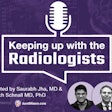
There's a lot of talk about quality metrics, pay for performance, value-based care, and penalties for poor outcomes. In this regard, it's useful to ask a basic question: What is quality? Or an even simpler question: Who is the better physician?
Let's consider two fictional radiologists: Dr. Singh and Dr. Jha.
 Dr. Saurabh Jha.
Dr. Saurabh Jha.
Dr. Singh is a fast reader. Her turnaround time for reports averages 15 minutes. Her reports are brief with a paucity of differential diagnoses. The language in her reports is decisive, and her reports contain very few disclaimers. She has a high specificity, meaning that when she flags pathology it is very likely to be present.
The problem is her sensitivity. She is known to miss subtle features of pathology.
There's another problem. Sometimes when reading her reports, one isn't reassured that she has looked at every organ. For example, her report of a CT scan of the abdomen once stated, "There is no appendicitis. Normal CT." The referring physician called her wondering if she had looked at the pancreas, since he was really worried about pancreatitis, not appendicitis. Dr. Singh had, but she had not bothered to list all normal organs in the report.
Dr. Jha is not as fast a reader as Dr. Singh. His turnaround time for reports averages 45 minutes. His reports are long and verbose. He meticulously lists all organs. For example, when reporting a CT of the abdomen of a male, he routinely mentions, "There are no gross abnormalities in the seminal vesicles and prostate," regardless of whether pathology is suspected or absence of pathology in those organs is of clinical relevance.
He presents a long list of possibilities, explaining why he thinks a diagnosis is or is not. He rarely comes down on a specific diagnosis.
Dr. Jha almost never misses pathology. He picks up tiny lung cancers, subtle thyroid cancers, and tiny bleeds in the brain. He has a very high sensitivity. This means that when he calls a study "normal," and he very rarely does, you can be certain that the study is normal.
The problem with Dr. Jha is specificity. He often raises false alarms such as "questionable pneumonia," "possible early appendicitis," and "subtle high density in the brain, small punctate hemorrhage not entirely excluded."
In fact, his colleagues have jokingly named a scan that he recommends as "The Jha Scan Redemption." These almost always turn out to be normal.
Which radiologist is of higher quality: Dr. Singh or Dr. Jha?
If you were a patient, who would you prefer read your scan, the undercalling, decisive Dr. Singh or the overcalling, painfully cautious Dr. Jha?
If you were a referring physician, which report would you value more, the brief report with decisive language and a paucity of differential diagnoses or the lengthy, verbose report with long lists on the differential?
If you were the payor, which radiologist would you wish the hospital employed, the one who recommended fewer studies or the one who recommended more studies?
If you were a hospital administrator, which radiologist would you award a higher bonus, the fast-reading Dr. Singh or the slow-reading Dr. Jha? This is not a slam-dunk answer, because the slow-reading overcaller generates more billable studies.
If you were the hospital's quality and safety officer or from risk management, what would you lose more sleep over, Dr. Singh's occasional false negatives or Dr. Jha's frequent false positives? Note, it takes far fewer false negatives to trigger a lawsuit than false positives.
I suppose you would like hard numbers to make an "informed" decision. Let me throw this one to you.
For every 10,000 chest x-rays Dr. Singh reads, she misses one lung cancer. Dr. Jha does not miss a single lung cancer, but he recommends 200 CT scans of the chest for "questionable nodule" per 10,000 chest x-rays. That is 200 more than Dr. Singh. And 199 out of 200 of these scans are normal.
Why choose?
I can hear the siren song of an objection: Why can't a physician have the sensitivity of Dr. Jha and the specificity of Dr. Singh? The caution of Dr. Jha and the speed of Dr. Singh? The decisiveness of Dr. Singh and the comprehensiveness of Dr. Jha?
You think I'm committing a bifurcation fallacy by enforcing a false dichotomy. Can't we have our specificity and eat it?
Sadly, I'm not. It is a known fact of signal detection theory that no matter how good one is, there is a trade-off between sensitivity and specificity. Meaning, if you want fewer false negatives -- for example, fewer missed cancers on chest x-ray -- there will be more false positives, such as negative CT scans for questioned findings on chest x-ray.
Trade-off is a fact of life. Yes, I know it's very un-American to acknowledge trade-offs. And I respect the sentiment. The country did, after all, send many men to the moon.
Nevertheless, whether we like it or not, trade-offs exist. And no more so than in the components that make up the amorphous terms "quality" and "value."
Missing cancer on a chest x-ray is poor quality (missed diagnosis). Overcalling a cancer on a chest x-ray which turns out to be nothing is poor quality (waste). But now you must decide which is poorer. Missed diagnosis or waste? And by how much is one poorer than the other?
That's a trade-off. Because if you want to approach zero misses, there will be more waste. And if we don't put our cards on the table, "quality" and "value" will just be meaningless magic talk. There, I just gave Hollywood an idea for the next "Shrek" movie, in which he breaks the iron triangle of quality, access, and costs, and rescues U.S. healthcare.
If I had a missed cancer on a chest x-ray, I would have wanted Dr. Jha to have read my chest x-ray. If I had no cancer then, I would have wanted Dr. Singh to have read my chest x-ray. Notice the conditional tense. Conditional on knowing the outcome.
In hindsight, we all know what we want. Hindsight is just useless mental posturing. The tough proposition is putting your money where your mouth is before the event -- before you know what will happen.
This is the ex-ante ex-post dilemma -- in case you want a clever term for what is patently common sense.
Dr. Singh is admired until she misses a subtle cancer on a chest x-ray. Then risk management is all over her case wondering, "Why? How? What systems must we change? What guidelines must we incorporate?"
Really? Must you ask?
Dr. Jha, on the other hand, is insidiously despised and ridiculed by everyone. All who remain unaware that he is merely a product of the zero-risk culture in the bosom of which all secretly wish to hide.
The trouble with quality is not just that it is nebulous in definition and protean in scope. It can mean whatever you want it to mean on a Friday. It is that it comprises elements that are inherently contradictory.
Society, whatever that means these days, must decide what it values, what it values more, and how much of what it values less it is willing to forfeit to attain what it values more.
Before you start paying physicians for performance and docking them for quality, can we be precise about what these terms mean, please?
Thank you.
This article originally appeared in the Health Care Blog. Dr. Jha is an academic radiologist who studies the value of imaging and encourages arguing for pedagogic benefits. He can be followed on Twitter at @RogueRad.
The comments and observations expressed herein are those of the author and do not necessarily reflect the opinions of AuntMinnie.com.



















